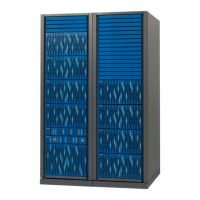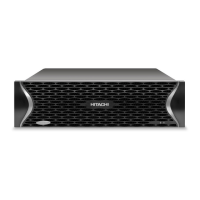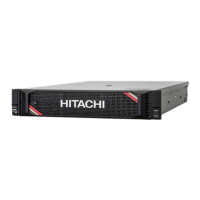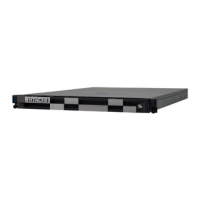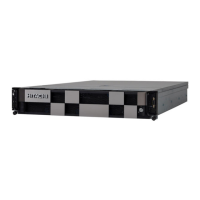# export HORCC_MRCF=1
# cat /etc/horcmperm.conf | grep vg01 | raidscan -find verify 1 -fd
OR
# vgdisplay -v /dev/vg01|grep dsk|sed 's/\/*\/dsk\//\/rdsk\//
g'|raidscan -find verify 1 -fd
DEVICE_FILE Group PairVol Device_File M
SERIAL LDEV
/dev/rdsk/c0t3d0 oradb1 oradev1 c0t3d0 1
35013 17
/dev/rdsk/c0t3d1 oradb1 oradev2 c0t3d1 1
35013 18
/dev/rdsk/c0t3d2 oradb oradev3 c0t3d2 1
35013 19
/dev/rdsk/c0t3d3 - - - 1
35013 20
Naming of $HORCMPERM file on Windows systems
$HORCMPERM is %windir%\horcmperm.conf or %windir%\horcmperm*.conf
(* = instance number) by default.
type $HORCMPERM | x:\HORCM\etc\raidscan.exe -find inst
# The following are an example to permit the DB Volumes.
# Note: a numerical value is interpreted as Harddisk#.
# DB0 For MU# 0
Hd0-10
harddisk12 harddisk13 harddisk17
# DB1 For MU# 1
hd20-23
Verifying a group for DB1. The following is an example of how to verify
whether a DB volume group is mapped to a group (MU#1 for ShadowImage)
in the horcm.conf file correctly.
D:\HORCM\etc> set HORCC_MRCF=1
D:\HORCM\etc> echo hd20-23 | raidscan -find verify 1 -fd
DEVICE_FILE Group PairVol Device_File M
SERIAL LDEV
Harddisk20 oradb1 oradev1 Harddisk20 1
35013 17
Harddisk21 oradb1 oradev2 Harddisk21 1
35013 18
Harddisk22 oradb oradev3 Harddisk22 1
35013 19
Harddisk23 - - - 1
35013 20
Without a $HORCMPERM file: Commands to run on different operating systems
If NO $HORCMPERM file exists, run a command on the host to permit all
volumes on the host.
Table 7-3 Without a $HORCMPERM file: Commands to
run on different operating systems on page 7-14 shows the command to run
on each operating system.
Data protection operations with CCI
7-13
Command Control Interface User and Reference Guide

